POL10002: A Critical Analysis of Liberal Internationalism's Strengths
VerifiedAdded on 2023/06/08
|8
|1972
|392
Essay
AI Summary
This essay provides a comprehensive analysis of liberal internationalism as a theory in international relations, highlighting its strengths and weaknesses in the context of world politics. It begins by introducing the core concepts of liberal internationalism and its emergence as an alternative to realism. The essay then delves into the strengths of the theory, such as its emphasis on collective security and the promotion of peace through international cooperation. It also discusses how liberal internationalism upholds human rights and democracy. However, the essay also addresses the weaknesses of the theory, including its potential for imposing Western values on other cultures, its reliance on governmental structures, and its susceptibility to exploitation. The conclusion summarizes the arguments and suggests that the strengths of liberal internationalism outweigh its weaknesses, especially in a globalized world.
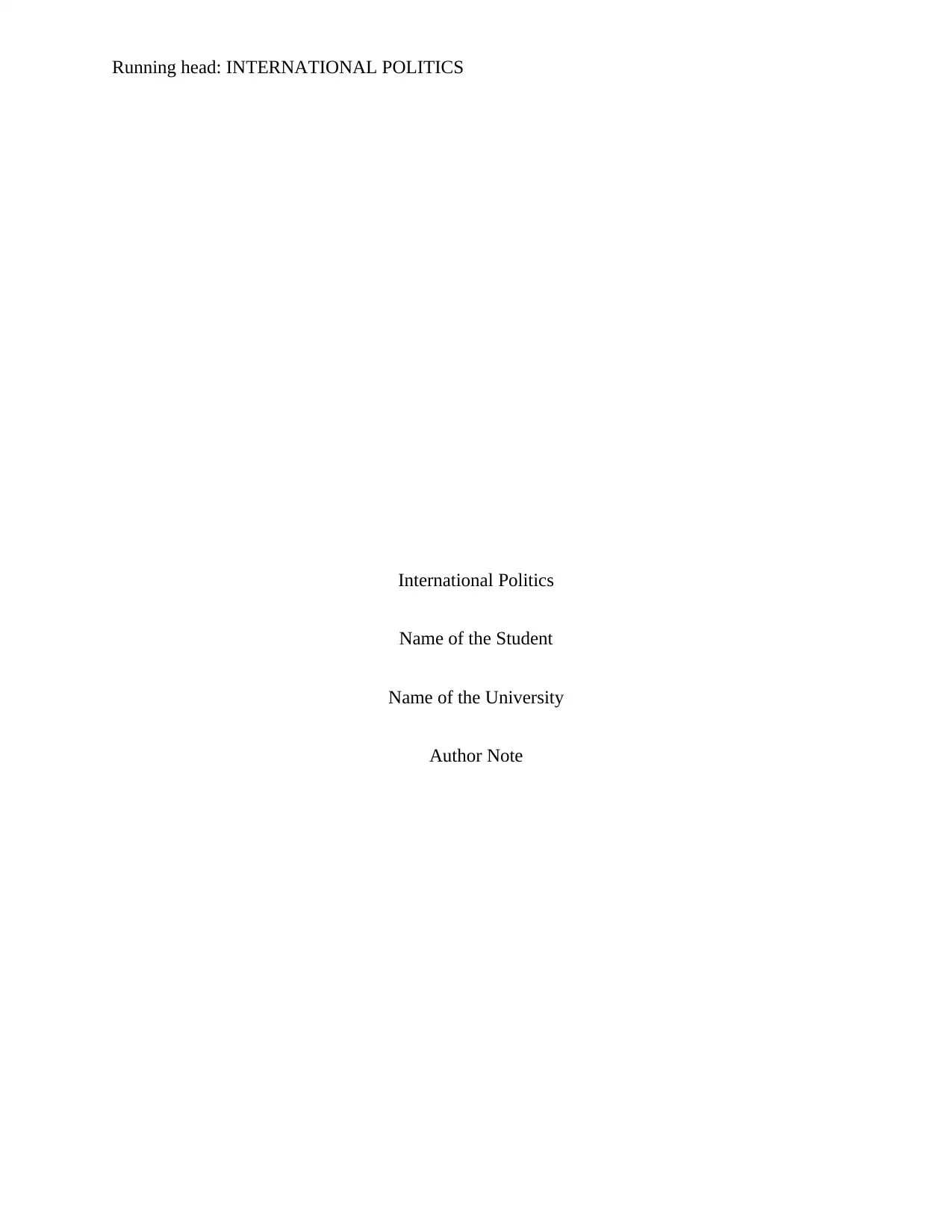
Running head: INTERNATIONAL POLITICS
International Politics
Name of the Student
Name of the University
Author Note
International Politics
Name of the Student
Name of the University
Author Note
Paraphrase This Document
Need a fresh take? Get an instant paraphrase of this document with our AI Paraphraser
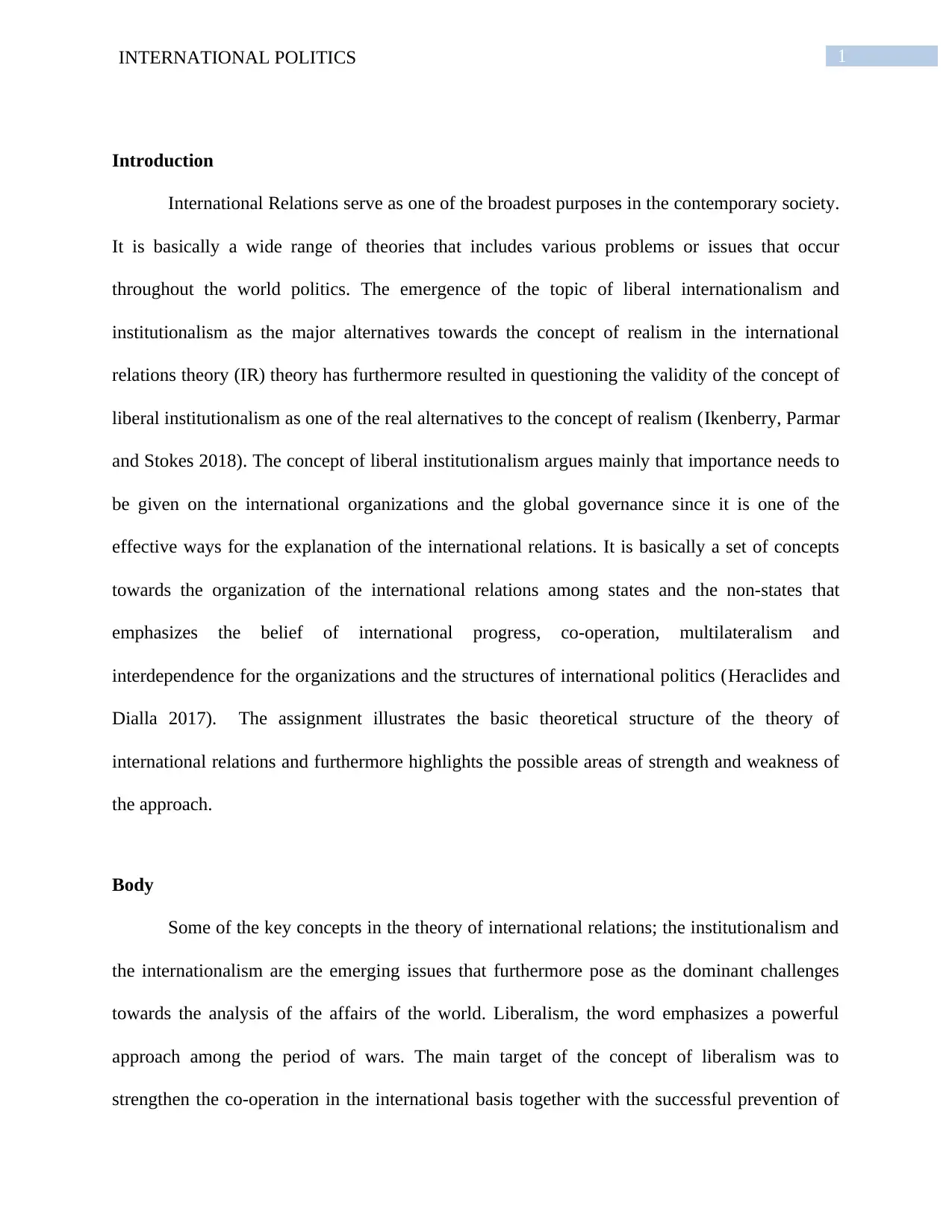
1INTERNATIONAL POLITICS
Introduction
International Relations serve as one of the broadest purposes in the contemporary society.
It is basically a wide range of theories that includes various problems or issues that occur
throughout the world politics. The emergence of the topic of liberal internationalism and
institutionalism as the major alternatives towards the concept of realism in the international
relations theory (IR) theory has furthermore resulted in questioning the validity of the concept of
liberal institutionalism as one of the real alternatives to the concept of realism (Ikenberry, Parmar
and Stokes 2018). The concept of liberal institutionalism argues mainly that importance needs to
be given on the international organizations and the global governance since it is one of the
effective ways for the explanation of the international relations. It is basically a set of concepts
towards the organization of the international relations among states and the non-states that
emphasizes the belief of international progress, co-operation, multilateralism and
interdependence for the organizations and the structures of international politics (Heraclides and
Dialla 2017). The assignment illustrates the basic theoretical structure of the theory of
international relations and furthermore highlights the possible areas of strength and weakness of
the approach.
Body
Some of the key concepts in the theory of international relations; the institutionalism and
the internationalism are the emerging issues that furthermore pose as the dominant challenges
towards the analysis of the affairs of the world. Liberalism, the word emphasizes a powerful
approach among the period of wars. The main target of the concept of liberalism was to
strengthen the co-operation in the international basis together with the successful prevention of
Introduction
International Relations serve as one of the broadest purposes in the contemporary society.
It is basically a wide range of theories that includes various problems or issues that occur
throughout the world politics. The emergence of the topic of liberal internationalism and
institutionalism as the major alternatives towards the concept of realism in the international
relations theory (IR) theory has furthermore resulted in questioning the validity of the concept of
liberal institutionalism as one of the real alternatives to the concept of realism (Ikenberry, Parmar
and Stokes 2018). The concept of liberal institutionalism argues mainly that importance needs to
be given on the international organizations and the global governance since it is one of the
effective ways for the explanation of the international relations. It is basically a set of concepts
towards the organization of the international relations among states and the non-states that
emphasizes the belief of international progress, co-operation, multilateralism and
interdependence for the organizations and the structures of international politics (Heraclides and
Dialla 2017). The assignment illustrates the basic theoretical structure of the theory of
international relations and furthermore highlights the possible areas of strength and weakness of
the approach.
Body
Some of the key concepts in the theory of international relations; the institutionalism and
the internationalism are the emerging issues that furthermore pose as the dominant challenges
towards the analysis of the affairs of the world. Liberalism, the word emphasizes a powerful
approach among the period of wars. The main target of the concept of liberalism was to
strengthen the co-operation in the international basis together with the successful prevention of
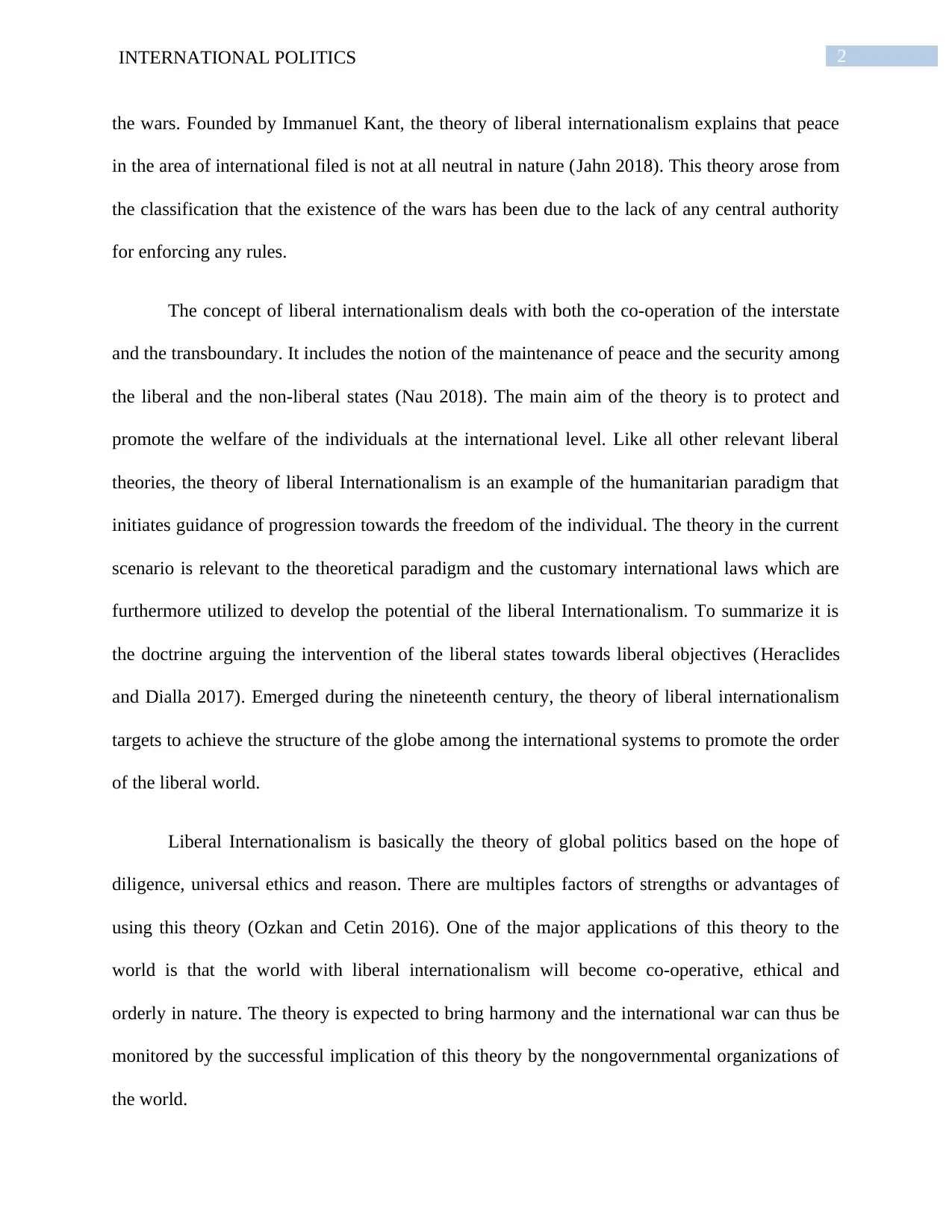
2INTERNATIONAL POLITICS
the wars. Founded by Immanuel Kant, the theory of liberal internationalism explains that peace
in the area of international filed is not at all neutral in nature (Jahn 2018). This theory arose from
the classification that the existence of the wars has been due to the lack of any central authority
for enforcing any rules.
The concept of liberal internationalism deals with both the co-operation of the interstate
and the transboundary. It includes the notion of the maintenance of peace and the security among
the liberal and the non-liberal states (Nau 2018). The main aim of the theory is to protect and
promote the welfare of the individuals at the international level. Like all other relevant liberal
theories, the theory of liberal Internationalism is an example of the humanitarian paradigm that
initiates guidance of progression towards the freedom of the individual. The theory in the current
scenario is relevant to the theoretical paradigm and the customary international laws which are
furthermore utilized to develop the potential of the liberal Internationalism. To summarize it is
the doctrine arguing the intervention of the liberal states towards liberal objectives (Heraclides
and Dialla 2017). Emerged during the nineteenth century, the theory of liberal internationalism
targets to achieve the structure of the globe among the international systems to promote the order
of the liberal world.
Liberal Internationalism is basically the theory of global politics based on the hope of
diligence, universal ethics and reason. There are multiples factors of strengths or advantages of
using this theory (Ozkan and Cetin 2016). One of the major applications of this theory to the
world is that the world with liberal internationalism will become co-operative, ethical and
orderly in nature. The theory is expected to bring harmony and the international war can thus be
monitored by the successful implication of this theory by the nongovernmental organizations of
the world.
the wars. Founded by Immanuel Kant, the theory of liberal internationalism explains that peace
in the area of international filed is not at all neutral in nature (Jahn 2018). This theory arose from
the classification that the existence of the wars has been due to the lack of any central authority
for enforcing any rules.
The concept of liberal internationalism deals with both the co-operation of the interstate
and the transboundary. It includes the notion of the maintenance of peace and the security among
the liberal and the non-liberal states (Nau 2018). The main aim of the theory is to protect and
promote the welfare of the individuals at the international level. Like all other relevant liberal
theories, the theory of liberal Internationalism is an example of the humanitarian paradigm that
initiates guidance of progression towards the freedom of the individual. The theory in the current
scenario is relevant to the theoretical paradigm and the customary international laws which are
furthermore utilized to develop the potential of the liberal Internationalism. To summarize it is
the doctrine arguing the intervention of the liberal states towards liberal objectives (Heraclides
and Dialla 2017). Emerged during the nineteenth century, the theory of liberal internationalism
targets to achieve the structure of the globe among the international systems to promote the order
of the liberal world.
Liberal Internationalism is basically the theory of global politics based on the hope of
diligence, universal ethics and reason. There are multiples factors of strengths or advantages of
using this theory (Ozkan and Cetin 2016). One of the major applications of this theory to the
world is that the world with liberal internationalism will become co-operative, ethical and
orderly in nature. The theory is expected to bring harmony and the international war can thus be
monitored by the successful implication of this theory by the nongovernmental organizations of
the world.
⊘ This is a preview!⊘
Do you want full access?
Subscribe today to unlock all pages.

Trusted by 1+ million students worldwide
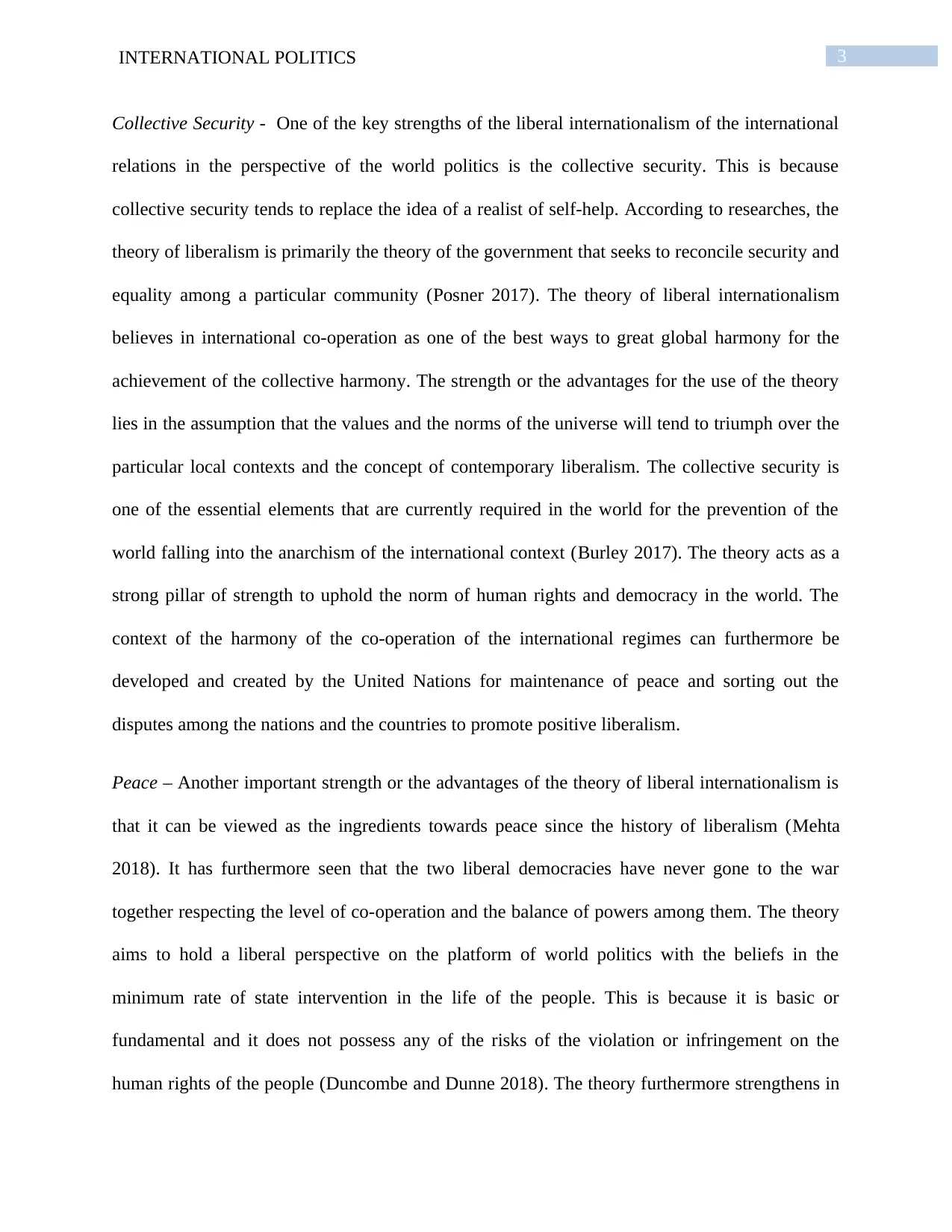
3INTERNATIONAL POLITICS
Collective Security - One of the key strengths of the liberal internationalism of the international
relations in the perspective of the world politics is the collective security. This is because
collective security tends to replace the idea of a realist of self-help. According to researches, the
theory of liberalism is primarily the theory of the government that seeks to reconcile security and
equality among a particular community (Posner 2017). The theory of liberal internationalism
believes in international co-operation as one of the best ways to great global harmony for the
achievement of the collective harmony. The strength or the advantages for the use of the theory
lies in the assumption that the values and the norms of the universe will tend to triumph over the
particular local contexts and the concept of contemporary liberalism. The collective security is
one of the essential elements that are currently required in the world for the prevention of the
world falling into the anarchism of the international context (Burley 2017). The theory acts as a
strong pillar of strength to uphold the norm of human rights and democracy in the world. The
context of the harmony of the co-operation of the international regimes can furthermore be
developed and created by the United Nations for maintenance of peace and sorting out the
disputes among the nations and the countries to promote positive liberalism.
Peace – Another important strength or the advantages of the theory of liberal internationalism is
that it can be viewed as the ingredients towards peace since the history of liberalism (Mehta
2018). It has furthermore seen that the two liberal democracies have never gone to the war
together respecting the level of co-operation and the balance of powers among them. The theory
aims to hold a liberal perspective on the platform of world politics with the beliefs in the
minimum rate of state intervention in the life of the people. This is because it is basic or
fundamental and it does not possess any of the risks of the violation or infringement on the
human rights of the people (Duncombe and Dunne 2018). The theory furthermore strengthens in
Collective Security - One of the key strengths of the liberal internationalism of the international
relations in the perspective of the world politics is the collective security. This is because
collective security tends to replace the idea of a realist of self-help. According to researches, the
theory of liberalism is primarily the theory of the government that seeks to reconcile security and
equality among a particular community (Posner 2017). The theory of liberal internationalism
believes in international co-operation as one of the best ways to great global harmony for the
achievement of the collective harmony. The strength or the advantages for the use of the theory
lies in the assumption that the values and the norms of the universe will tend to triumph over the
particular local contexts and the concept of contemporary liberalism. The collective security is
one of the essential elements that are currently required in the world for the prevention of the
world falling into the anarchism of the international context (Burley 2017). The theory acts as a
strong pillar of strength to uphold the norm of human rights and democracy in the world. The
context of the harmony of the co-operation of the international regimes can furthermore be
developed and created by the United Nations for maintenance of peace and sorting out the
disputes among the nations and the countries to promote positive liberalism.
Peace – Another important strength or the advantages of the theory of liberal internationalism is
that it can be viewed as the ingredients towards peace since the history of liberalism (Mehta
2018). It has furthermore seen that the two liberal democracies have never gone to the war
together respecting the level of co-operation and the balance of powers among them. The theory
aims to hold a liberal perspective on the platform of world politics with the beliefs in the
minimum rate of state intervention in the life of the people. This is because it is basic or
fundamental and it does not possess any of the risks of the violation or infringement on the
human rights of the people (Duncombe and Dunne 2018). The theory furthermore strengthens in
Paraphrase This Document
Need a fresh take? Get an instant paraphrase of this document with our AI Paraphraser
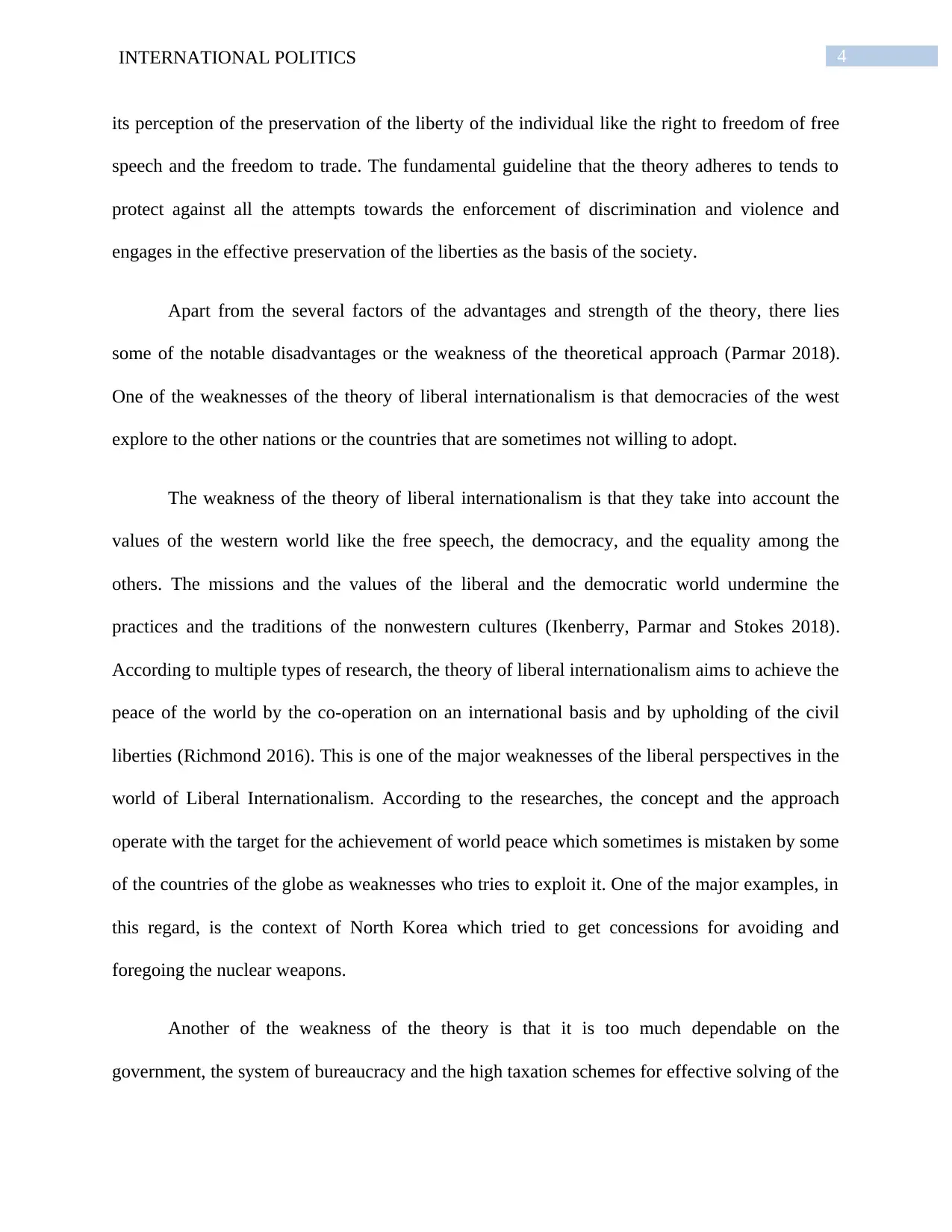
4INTERNATIONAL POLITICS
its perception of the preservation of the liberty of the individual like the right to freedom of free
speech and the freedom to trade. The fundamental guideline that the theory adheres to tends to
protect against all the attempts towards the enforcement of discrimination and violence and
engages in the effective preservation of the liberties as the basis of the society.
Apart from the several factors of the advantages and strength of the theory, there lies
some of the notable disadvantages or the weakness of the theoretical approach (Parmar 2018).
One of the weaknesses of the theory of liberal internationalism is that democracies of the west
explore to the other nations or the countries that are sometimes not willing to adopt.
The weakness of the theory of liberal internationalism is that they take into account the
values of the western world like the free speech, the democracy, and the equality among the
others. The missions and the values of the liberal and the democratic world undermine the
practices and the traditions of the nonwestern cultures (Ikenberry, Parmar and Stokes 2018).
According to multiple types of research, the theory of liberal internationalism aims to achieve the
peace of the world by the co-operation on an international basis and by upholding of the civil
liberties (Richmond 2016). This is one of the major weaknesses of the liberal perspectives in the
world of Liberal Internationalism. According to the researches, the concept and the approach
operate with the target for the achievement of world peace which sometimes is mistaken by some
of the countries of the globe as weaknesses who tries to exploit it. One of the major examples, in
this regard, is the context of North Korea which tried to get concessions for avoiding and
foregoing the nuclear weapons.
Another of the weakness of the theory is that it is too much dependable on the
government, the system of bureaucracy and the high taxation schemes for effective solving of the
its perception of the preservation of the liberty of the individual like the right to freedom of free
speech and the freedom to trade. The fundamental guideline that the theory adheres to tends to
protect against all the attempts towards the enforcement of discrimination and violence and
engages in the effective preservation of the liberties as the basis of the society.
Apart from the several factors of the advantages and strength of the theory, there lies
some of the notable disadvantages or the weakness of the theoretical approach (Parmar 2018).
One of the weaknesses of the theory of liberal internationalism is that democracies of the west
explore to the other nations or the countries that are sometimes not willing to adopt.
The weakness of the theory of liberal internationalism is that they take into account the
values of the western world like the free speech, the democracy, and the equality among the
others. The missions and the values of the liberal and the democratic world undermine the
practices and the traditions of the nonwestern cultures (Ikenberry, Parmar and Stokes 2018).
According to multiple types of research, the theory of liberal internationalism aims to achieve the
peace of the world by the co-operation on an international basis and by upholding of the civil
liberties (Richmond 2016). This is one of the major weaknesses of the liberal perspectives in the
world of Liberal Internationalism. According to the researches, the concept and the approach
operate with the target for the achievement of world peace which sometimes is mistaken by some
of the countries of the globe as weaknesses who tries to exploit it. One of the major examples, in
this regard, is the context of North Korea which tried to get concessions for avoiding and
foregoing the nuclear weapons.
Another of the weakness of the theory is that it is too much dependable on the
government, the system of bureaucracy and the high taxation schemes for effective solving of the
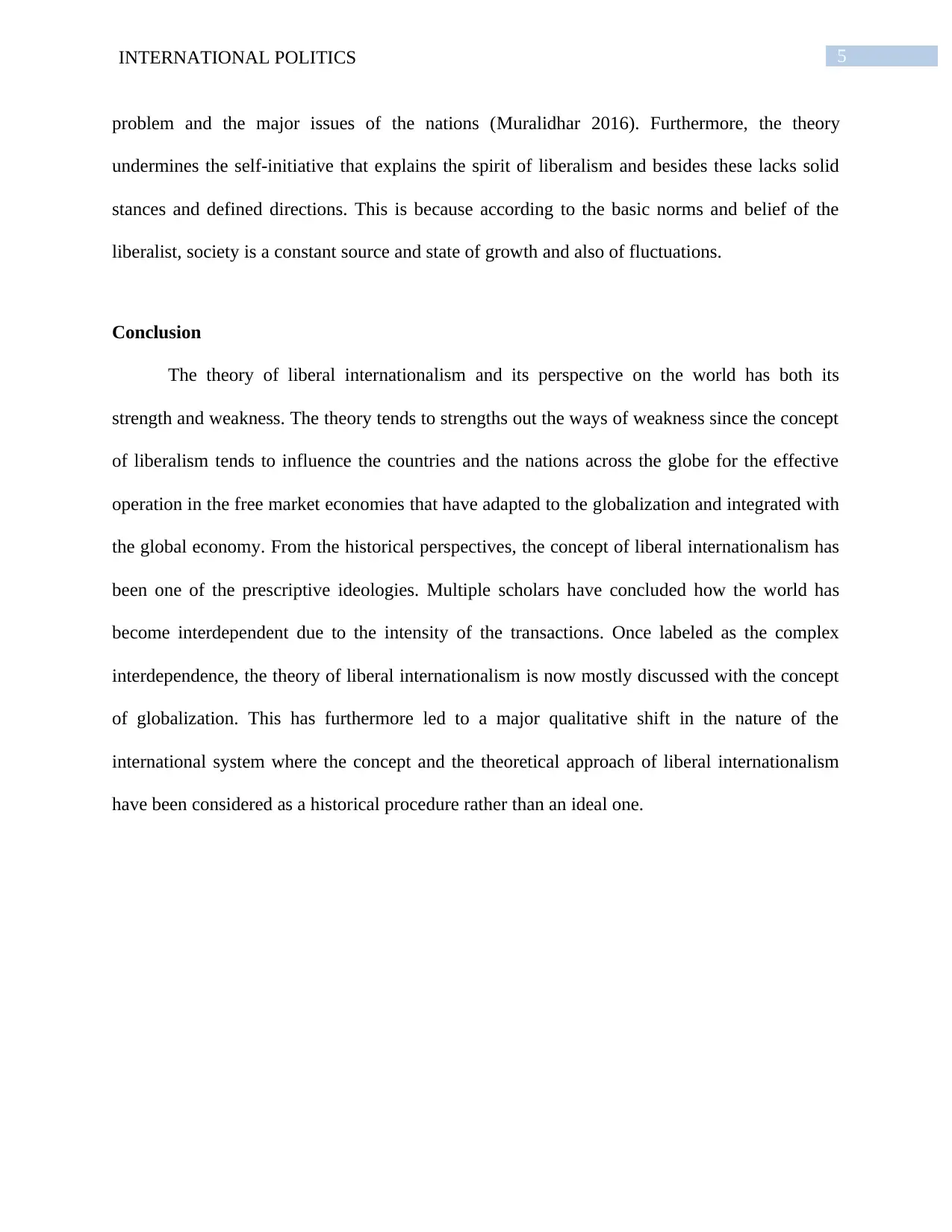
5INTERNATIONAL POLITICS
problem and the major issues of the nations (Muralidhar 2016). Furthermore, the theory
undermines the self-initiative that explains the spirit of liberalism and besides these lacks solid
stances and defined directions. This is because according to the basic norms and belief of the
liberalist, society is a constant source and state of growth and also of fluctuations.
Conclusion
The theory of liberal internationalism and its perspective on the world has both its
strength and weakness. The theory tends to strengths out the ways of weakness since the concept
of liberalism tends to influence the countries and the nations across the globe for the effective
operation in the free market economies that have adapted to the globalization and integrated with
the global economy. From the historical perspectives, the concept of liberal internationalism has
been one of the prescriptive ideologies. Multiple scholars have concluded how the world has
become interdependent due to the intensity of the transactions. Once labeled as the complex
interdependence, the theory of liberal internationalism is now mostly discussed with the concept
of globalization. This has furthermore led to a major qualitative shift in the nature of the
international system where the concept and the theoretical approach of liberal internationalism
have been considered as a historical procedure rather than an ideal one.
problem and the major issues of the nations (Muralidhar 2016). Furthermore, the theory
undermines the self-initiative that explains the spirit of liberalism and besides these lacks solid
stances and defined directions. This is because according to the basic norms and belief of the
liberalist, society is a constant source and state of growth and also of fluctuations.
Conclusion
The theory of liberal internationalism and its perspective on the world has both its
strength and weakness. The theory tends to strengths out the ways of weakness since the concept
of liberalism tends to influence the countries and the nations across the globe for the effective
operation in the free market economies that have adapted to the globalization and integrated with
the global economy. From the historical perspectives, the concept of liberal internationalism has
been one of the prescriptive ideologies. Multiple scholars have concluded how the world has
become interdependent due to the intensity of the transactions. Once labeled as the complex
interdependence, the theory of liberal internationalism is now mostly discussed with the concept
of globalization. This has furthermore led to a major qualitative shift in the nature of the
international system where the concept and the theoretical approach of liberal internationalism
have been considered as a historical procedure rather than an ideal one.
⊘ This is a preview!⊘
Do you want full access?
Subscribe today to unlock all pages.

Trusted by 1+ million students worldwide
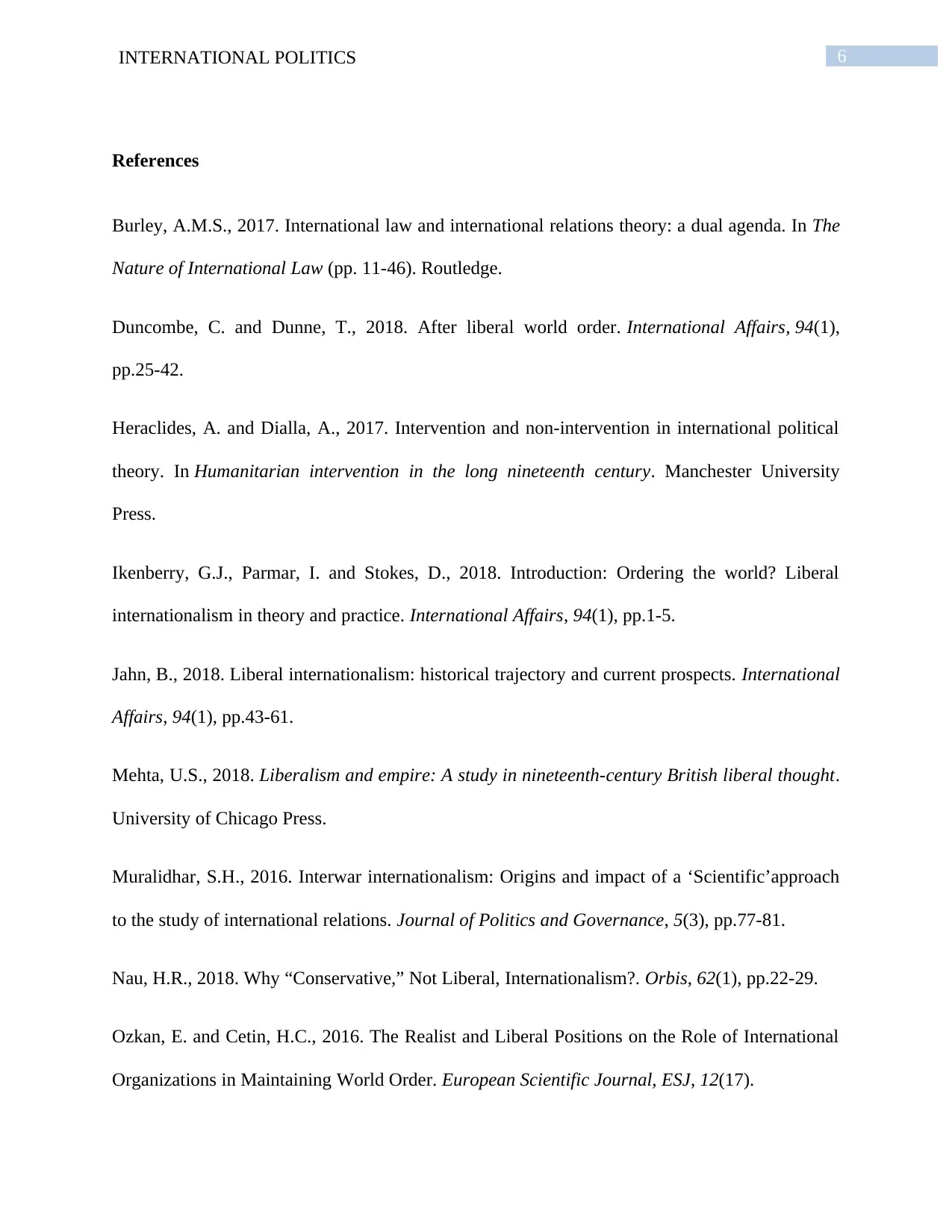
6INTERNATIONAL POLITICS
References
Burley, A.M.S., 2017. International law and international relations theory: a dual agenda. In The
Nature of International Law (pp. 11-46). Routledge.
Duncombe, C. and Dunne, T., 2018. After liberal world order. International Affairs, 94(1),
pp.25-42.
Heraclides, A. and Dialla, A., 2017. Intervention and non-intervention in international political
theory. In Humanitarian intervention in the long nineteenth century. Manchester University
Press.
Ikenberry, G.J., Parmar, I. and Stokes, D., 2018. Introduction: Ordering the world? Liberal
internationalism in theory and practice. International Affairs, 94(1), pp.1-5.
Jahn, B., 2018. Liberal internationalism: historical trajectory and current prospects. International
Affairs, 94(1), pp.43-61.
Mehta, U.S., 2018. Liberalism and empire: A study in nineteenth-century British liberal thought.
University of Chicago Press.
Muralidhar, S.H., 2016. Interwar internationalism: Origins and impact of a ‘Scientific’approach
to the study of international relations. Journal of Politics and Governance, 5(3), pp.77-81.
Nau, H.R., 2018. Why “Conservative,” Not Liberal, Internationalism?. Orbis, 62(1), pp.22-29.
Ozkan, E. and Cetin, H.C., 2016. The Realist and Liberal Positions on the Role of International
Organizations in Maintaining World Order. European Scientific Journal, ESJ, 12(17).
References
Burley, A.M.S., 2017. International law and international relations theory: a dual agenda. In The
Nature of International Law (pp. 11-46). Routledge.
Duncombe, C. and Dunne, T., 2018. After liberal world order. International Affairs, 94(1),
pp.25-42.
Heraclides, A. and Dialla, A., 2017. Intervention and non-intervention in international political
theory. In Humanitarian intervention in the long nineteenth century. Manchester University
Press.
Ikenberry, G.J., Parmar, I. and Stokes, D., 2018. Introduction: Ordering the world? Liberal
internationalism in theory and practice. International Affairs, 94(1), pp.1-5.
Jahn, B., 2018. Liberal internationalism: historical trajectory and current prospects. International
Affairs, 94(1), pp.43-61.
Mehta, U.S., 2018. Liberalism and empire: A study in nineteenth-century British liberal thought.
University of Chicago Press.
Muralidhar, S.H., 2016. Interwar internationalism: Origins and impact of a ‘Scientific’approach
to the study of international relations. Journal of Politics and Governance, 5(3), pp.77-81.
Nau, H.R., 2018. Why “Conservative,” Not Liberal, Internationalism?. Orbis, 62(1), pp.22-29.
Ozkan, E. and Cetin, H.C., 2016. The Realist and Liberal Positions on the Role of International
Organizations in Maintaining World Order. European Scientific Journal, ESJ, 12(17).
Paraphrase This Document
Need a fresh take? Get an instant paraphrase of this document with our AI Paraphraser
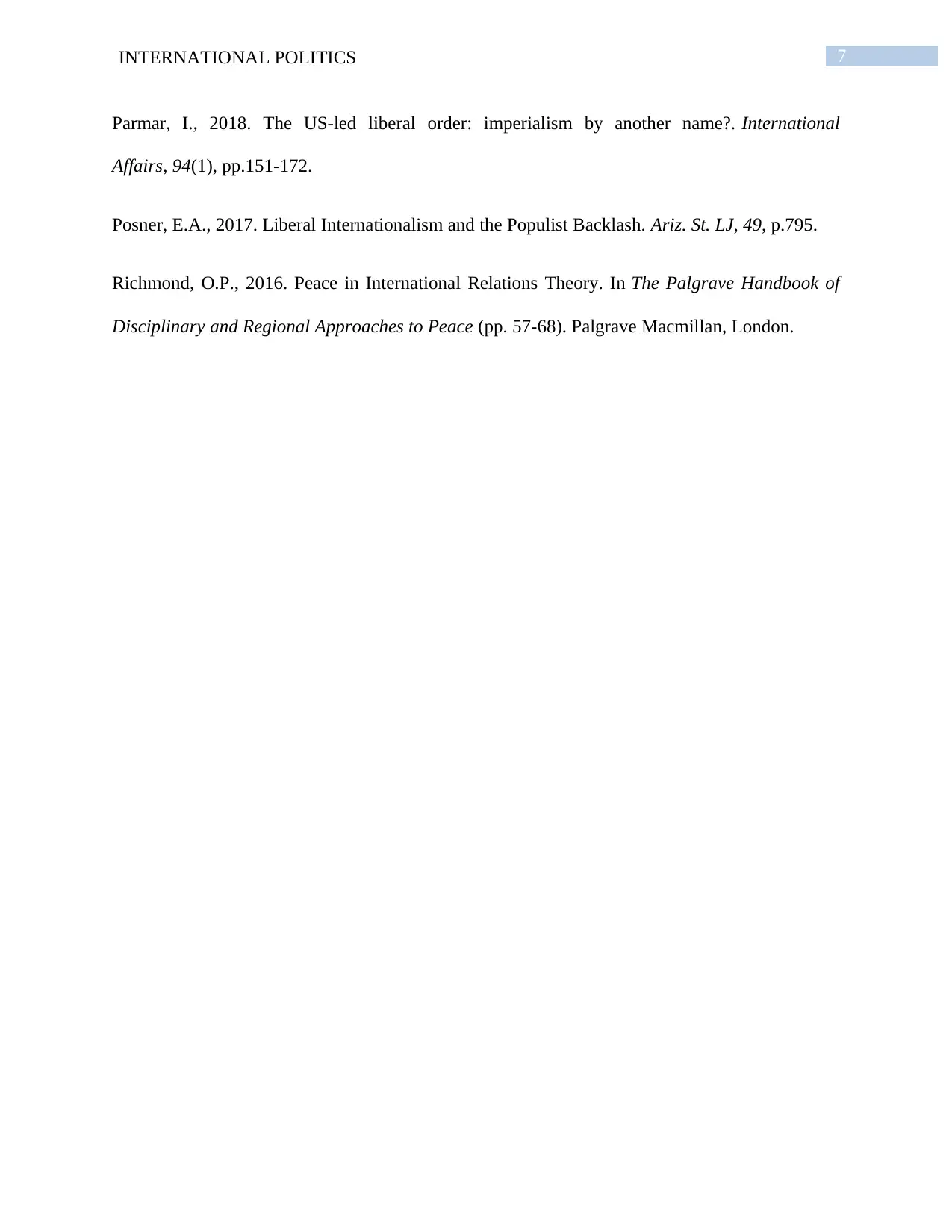
7INTERNATIONAL POLITICS
Parmar, I., 2018. The US-led liberal order: imperialism by another name?. International
Affairs, 94(1), pp.151-172.
Posner, E.A., 2017. Liberal Internationalism and the Populist Backlash. Ariz. St. LJ, 49, p.795.
Richmond, O.P., 2016. Peace in International Relations Theory. In The Palgrave Handbook of
Disciplinary and Regional Approaches to Peace (pp. 57-68). Palgrave Macmillan, London.
Parmar, I., 2018. The US-led liberal order: imperialism by another name?. International
Affairs, 94(1), pp.151-172.
Posner, E.A., 2017. Liberal Internationalism and the Populist Backlash. Ariz. St. LJ, 49, p.795.
Richmond, O.P., 2016. Peace in International Relations Theory. In The Palgrave Handbook of
Disciplinary and Regional Approaches to Peace (pp. 57-68). Palgrave Macmillan, London.
1 out of 8
Related Documents
Your All-in-One AI-Powered Toolkit for Academic Success.
+13062052269
info@desklib.com
Available 24*7 on WhatsApp / Email
![[object Object]](/_next/static/media/star-bottom.7253800d.svg)
Unlock your academic potential
Copyright © 2020–2026 A2Z Services. All Rights Reserved. Developed and managed by ZUCOL.





